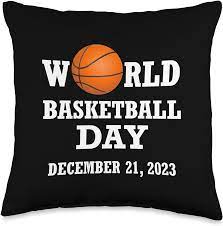
World Basketball Day is an annual celebration held on December 21, commemorating the invention of basketball by Dr. James Naismith in 1891. The sport has grown into one of the most popular and widely practiced games globally, uniting people with its athleticism, joy, and camaraderie. This article delves into the history, significance, and impact of basketball on the world stage.History of BasketballDr. James Naismith, a Canadian physical education educator, invented basketball on December 21, 1891, at the International YMCA Training School in Springfield, Massachusetts, USA. The game was created to keep students active during the winter months. Recognizing the global influence of the sport, the United Nations declared August 25, 2023, as World Basketball Day through resolution A/RES/77/324.Significance of World Basketball DayThe annual celebration highlights Naismith’s impact on players, fans, and communities worldwide. It promotes cooperation, teamwork, and communication, emphasizing how these traits contribute to harmony and understanding. World Basketball Day recognizes the sport’s role in international trade, peace, and diplomacy, fostering an environment of collaboration, physical activity, and interdependence.UN’s Call for Lasting LegacyThe United Nations General Assembly encourages efforts to ensure that the International Basketball Federation Basketball World Cup 2023 leaves a lasting legacy for peace and development globally. Indonesia, Japan, and the Philippines are commended for hosting the tournament, showcasing the potential of basketball as a unifying force.Facts about BasketballGlobal Reach: FIBA estimates over 450 million basketball players worldwide.
Basketball’s Evolution
Basketball has evolved from its inception in 1891, with notable milestones: 1895: First Intercollegiate Basketball Competition.
Fun Facts about Basketball:
- The term “basketball” was first used by Naismith in 1891.
- Fruit baskets were initially used to catch the ball during play.
- Backboards and string baskets were added in 1900 to prevent interference.





